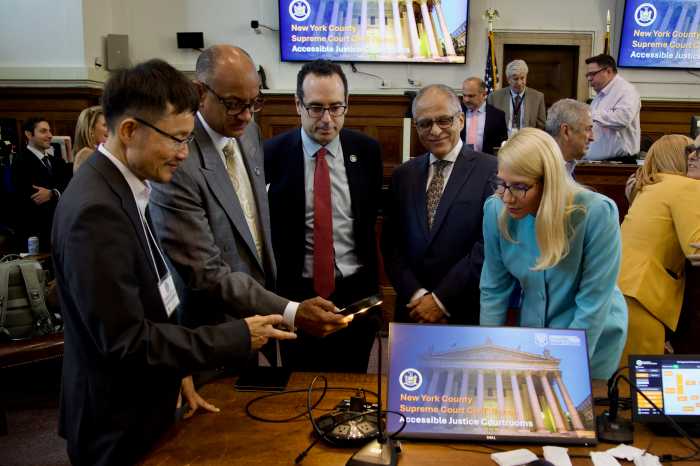By Dara Pettinelli
He looked out the window and saw an emaciated, skimpily clad young man about two years his senior, talking to a scruffy, dirty older gentleman. This gentleman handed the young man some cash. As the young man reached out for the money, Gomez noticed track marks up the man's arms and realized this was an old friend of his, Diablito, Spanish for “little devil.” This little devil, however, had been a mentor, a hero, to Gomez as a young boy growing up on the Lower East Side of the city. Diablito protected Gomez from bullies in the neighborhood who taunted him with cockroaches, fists and accusatory words. And now over a decade later, his protector was exchanging his body for drug money. “I asked myself, 'What in God's name is the difference between me and this kid? Why did he go one way and I went another way?',” said Gomez. Gomez made a commitment on that bus, which stands as the mission statement for his life today: To show the Diablitos and the little Jeffs of the world how to make decisions that will lead them towards something constructive and take them out of a situation which can end in such a terrible way. “I want to show them that there are alternatives and choices that you can make even if the impression is that there is none,” said Gomez, who avoided sinking into the dark side of life by chasing real and imaginary monsters in a park in Flushing named Kissena. Kissena Park is a place where Gomez and lifelong friend and business partner, Mark Pensavalle grew up. It's where Pensavalle lived, played baseball and went to school. It's where Gomez played Dungeons & Dragons, imitated Sherlock Holmes, created fantasy worlds and where, as an adult, he proposed to his wife. It's where Gomez and Pensavalle hung out and played games with their neighborhood buddies. And now, it's the name of their new publishing company, Kissena Park Press, which launched in January. “Our stories will be about how one can elevate one's self by altering one's perception of one's world,” said Pensavalle. The company will start out publishing adult trade fiction, but they're open to a range of genres and target audiences. Gomez described the company as a “dream factory” that will publish the work of people they respect and admire, who otherwise may not have had a chance to see their name in print and then translate their books into other appropriate media outlets, like movies and television specials. “If I'm reading something and it makes me look at the world in a slightly different way and I come out the better for it, then that makes it a Kissena Park Press story,” Gomez said. It sounds like a grandiose idea generated by two dreamers. And that's exactly the story of Gomez and Pensavalle.Although Gomez was born in Manhattan and spent his early childhood living on the Lower East Side, he and Pensavalle spent the majority of their lives in Flushing. Gomez – the son of a Jewish father and a Puerto Rican mother who became pregnant with him at age 15 – and Pensavalle, the son of a Sicilian immigrant father and Queens-born mother, faced adversity early on in life. Gomez was born with partial facial paralysis due to a bad forecept delivery. He started out with a foster family until his mother saved enough money to reclaim her son and take him out of the city and into Queens. His parents divorced. Kids constantly taunted him for being different. Pensavalle spent the first few years of his childhood living on the north side of Kissena Park and at age 10, his family moved to the south side, causing him to lose all his old friends and his sense of identity. At the same time the boys confronted their earliest feelings of loneliness, the film “West Side Story” played on television screens throughout the country. The story depicted the inner city conflict between immigrants, as shown through the gang, “the Sharks,” and White America, as shown through the gang, “the Jets.””All the kids came into school wanting to be a Jet, and I wanted to be a Jet, too,” said Gomez, “but they said: 'No, Jeff, you're a Shark. You're Puerto Rican.'” This experience solidified his realization that he was different, unacceptable and expected to play the hand he was dealt. “A hard work ethic was instilled in us by the older generation but we were told: 'You can only accomplish so much in life and that should be enough to make you happy,'” said Pensavalle. As part of the working class, Gomez and Pensavalle's parents reiterated to their children the importance of hard work and job security – there was no room for dreams. But dreams were all the boys had to get them through the grit of city life and an overwhelming sense of loneliness they felt as creative, diverse children living in a world dominated by unwritten but well-known rules. And so Kissena Park, a landscape of baseball fields, lakes and wilderness, about a quarter of the size of Central Park, served as the canvas where their imaginary and real worlds collided, and where they made all the rules. “As a loner, I began to explore Kissena Park,” said Gomez. “It was fascinating to me because it was unlike any other environment I had encountered.” At the same time he began exploring the park, Gomez delved into mythological books, like Tolkien's “The Lord of the Rings.” “As a 10- or 11-year-old, you could get lost in this park,” Gomez said. “Walking through Kissena Park, I was in one of those fantasy worlds I had read about and it was very inspiring.” His favorite activity in the park was playing Dungeons & Dragons with his buddies. Gomez would gather his friends – a racially diverse group of neighborhood boys who didn't fit in anywhere else, described as “the rainbow coalition” and “street toughs in leather jackets,” by Gomez and Pensavalle – sit them down and weave these stories for them where they were essentially empowered to create change in a fantasy world.”Within the game, you invent the storyline,” Gomez recounted. “I made the characters realistic, from Earth, but allowed for dragons and sword fights to keep my friends interested in playing the game.” He wanted his friends to realize that they could go anywhere and do anything in this world. “I had them follow a general storyline that I had in mind for them so that they could become enlightened heroes who would save my planet from evil,” said Gomez.Playing Gomez's games and following his story plots, “allowed me to be someone I was not,” said Pensavalle. “It opened up options and views of the world that I wasn't allowed to experience as a child.”Gomez agreed. “It made me realize that we, these two little Flushing boys, could effect some sort of change in the world.” And they did. Driven by their own life experiences, Gomez and Pensavalle have dedicated themselves to multiple charities focused on inspiring underprivileged kids growing up in the city and acting as living proof that everyone creates their own destiny.After graduating from Queens College in 1985, Gomez served as a substitute teacher in some of the city's most challenged neighborhoods. He realized he could keep the kids' attention by teaching them through pop culture. He later translated this skill into a career in entertainment. He's written, produced and created successful films, video games, novels, trading cards, comic books among other products, for Fortune 1,000 companies such as Mattel and Nintendo. Upon graduating from Baruch College in 1986, Pensavalle took his creative and business skills and managed indie bands in the city. Although he enjoyed making albums and going on tours, Pensavalle realized the music industry wasn't for him. “There's backstabbing in the industry and I learned that's not me,” said Pensavalle. “I'm a wise-guy and try to be funny, but I would never pull money out of your pocket.” And despite the fact that music was his passion, he eventually let it go. “It's about facing your fears and admitting certain things in your life that maybe you should let go and grasp onto something else that is for you,” he said. So he went into book publishing and ended up working on high-profile projects at HarperCollins, Random House and Bertlesmann for over a decade. He loved the creative process involved in taking a manuscript and packaging it for an audience. But when conglomerates started taking over publishing houses, the creative process diminished in favor of formulas and Pensavalle felt lost.The playing field was changing once again and Pensavalle was ready to walk down a new path. Then the phone rang. It was his old pal, Gomez, wanting to know if Pensavalle would be interested in starting a company with him. “I said, 'let's roll the dice,'” reminisced Pensavalle, and Starlight Runner was born. It officially launched in 2000 and has since developed new and established intellectual properties across various media outlets for clients such as Scholastic Books, Marvel Comics and Acclaim Entertainment. Yet, for five years before forming Kissena Park Press, there was an untapped outlet for the business partners to explore. “We thought now that we've proven ourselves and established a track record, it was time to launch our own intellectual properties and give others the chance to do so,” said Gomez.They wanted to give the company a distinctive name, separate from Starlight Runner, one that would adequately define their goals. No name is more apropos for their publishing company, a vehicle for storytellers, than Kissena Park Press. “It's a self-contained endeavor,” said Gomez, who explained that the company does not strive to compete with large publishers like Random House. The company will remain independent so that Pensavalle and Gomez can nurture stories and their authors. Considering that the same staff of about 10 people who work at Starlight Runner will work at Kissena Park Press, they have the luxury of printing about three to five books a year and devote personal attention to each one. Pensavalle's connections to the publishing world came in handy and they have a page designer from Scholastic on staff in addition to an agreement with an extremely popular printing press also used by Bertlesmann. In addition to the success of getting important people on board, Gomez and Pensavalle received more than 100 submissions from writers after releasing a press statement in January about the launch of the company. Out of all the submissions, which came in the form of synopses, chapters and manuscripts, one story in particular caught the eye of Gomez and Pensavalle. The book is entitled “Marathon,” written by William Winokur, who spent over 20 years as an investment banker until he realized his passion for writing. He claims to have received an offer from a very large, traditional publisher but passed in favor of Kissena Park Press. “What appealed to me most about Kissena Park Press was their entrepenurial spirit and clear dedication to foster literary works that both inspire and take readers on a journey,” said Winokur. His story, which will be released in the fall of 2005, is about a female attorney who is emotionally disengaged with her life. After her father dies, she gets reacquainted with an old friend of his and previous mentor of hers. His name is Ion Theodore, a Greek man who ran in the Olympics as a marathon runner. Theodore convinces the woman to take one last trip with him to Greece before he dies. She goes to Greece and goes on a journey of self-exploration and realization that changes her life. It's a 500-page work of fiction that's based on historical events and characters from the author's own life. “Marathon is both a labor of love to honor the man who shaped my life, as well as a journey into that moment in all of our lives when we wake up and suddenly ask ourselves: 'What is my life really about, and have I been true to the dreams I held dear in my youth?'”




































